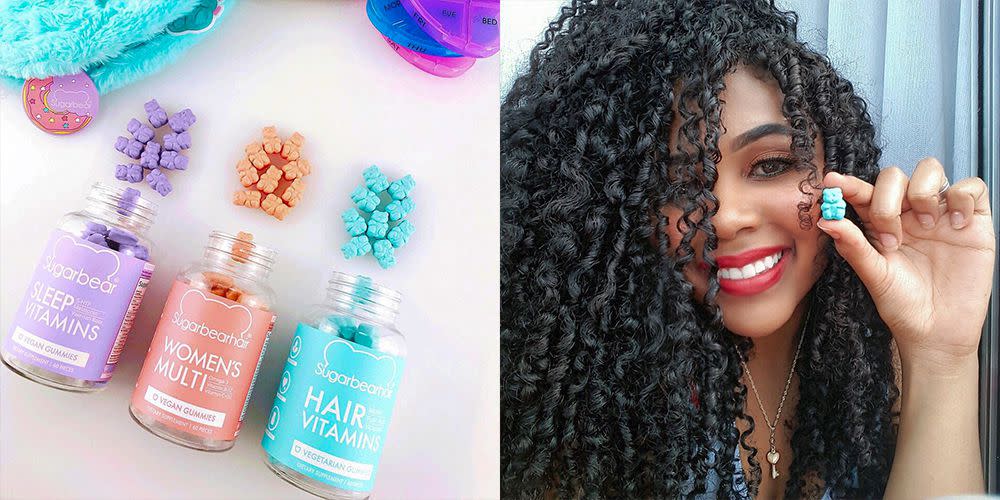Here's the Truth About Those SugarBearHair Vitamins That Are Causing a Stir on the Internet

They look just like candy, but the popular SugarBearHair gummy vitamins all over Instagram supposedly help with everything from healthy hair to better sleep, depending on the type. The Kardashians regularly tout the bottles on their own social media feeds, but the rainbow-colored supplements recently sparked another viral moment. A sponsored Instagram post promoting the gummies sparked a "feud" between beauty influencers James Charles and Tati Westbrook, his mentor who owns a rival supplement company.
While the vloggers mutually agreed to put their dispute to rest, promoting the vitamins ended up costing cost Charles some 3 million YouTube subscribers and Westbrook potentially thousands of dollars in sales. So are these SugarBearHair gummies even that good? We talked to Jaclyn London, MS, RD, CDN, Nutrition Director at the Good Housekeeping Institute to find out.
A post shared by SugarBearHair OFFICIAL (@sugarbearhair) on May 17, 2019 at 5:17pm PDT
What's in SugarBearHair?
SugarBearHair claims its vitamins are made with real berries and a "dash of sugar." The full list of ingredients for the hair vitamins include: glucose syrup, sugar, water, pectin, citric acid, sodium citrate, natural flavors, titanium dioxide, Blue 1, coconut oil, and carnauba wax.
The serving size of two gummies contains 3 grams of added sugars and 15 calories. They provide:
Vitamin A: 42% daily value
Vitamin C: 33% daily value
Vitamin D: 100% daily value
Vitamin E: 55% daily value
Vitamin B-6: 100% daily value
Folic Acid: 65% daily value
Vitamin B-12: 100% daily value
Biotin: 1667% daily value
A post shared by Kim Kardashian West (@kimkardashian) on Dec 13, 2018 at 12:38pm PST
Do SugarBearHair vitamins really work?
SugarBearHair claims you only need to swallow two of its gummy bears per day to "meet your hair goals," but unfortunately there's no guarantee they'll do much.
"From a clinical POV, there’s really not enough data to support taking multivitamins for better hair, skin, and nails unless you know you’re deficient in one (or all) of the nutrients found in SugarBearHair," London says.
Take the main ingredient, biotin, for example. Each serving provides more than 150 times what you'd need in a day, but there's zero evidence to suggest that biotin supplementation will improve hair growth and texture in people who already get enough, according to independent testing program ConsumerLab.com.
Plus, the FDA does not oversee or approve vitamins like SugarBearHair for safety and efficacy. "We have no way of knowing if what you think you’re taking is exactly what’s in the bottle, since there’s no regulation surrounding the ingredients and supply chain," London adds. "Plus, the other vitamins included in the product are provided in pretty moderate amounts, meaning that you can get what you need from food - more veggies, fruit, and seafood."
Some great choices for hair-boosting protein, omega-3's, and vitamins include salmon, spinach, kale, pumpkin, tomatoes, asparagus, and grapes.
Since an underlying condition can cause vitamin deficiencies, talk to your doctor if you're really concerned. If you do need a multivitamin, search out supplements with a third-party testing symbol on packaging, like ConsumerLab.com, NSF for Sport, or USP, London says. Many verified options out there cost just a few cents per capsule and contain more iron and calcium. Compare that to the $30 price tag on a SugarBearHair bottle, which breaks down to $1 per day.
No matter what, always let your healthcare provider know that you're using a supplement. Taking high doses of biotin can skew the results of certain lab tests.
A post shared by SugarBearHair OFFICIAL (@sugarbearhair) on May 18, 2019 at 11:32am PDT
What about SugarBear sleep vitamins?
The sleep supplements at the center of the James Charles feud also cost $30 per bottle. They include similar ingredients, plus melatonin, magnesium, and a "rest well blend" that features lemon balm leaf, passion flower, and valerian root. But will they really knock you out at night?
"Melatonin may help, along with vitamin B-6 and magnesium, but the combo of these ingredients and their bioavailability in your body remains to be seen," London says. "Your best bet is to eat more foods high in magnesium, potassium, and calcium about 30 minutes to one hour before bed."
She recommends combining a mix of lean protein and some carbs, like crackers with peanut butter, cereal with milk, or banana with a handful of nuts. "These nutrient combos help to boost your body’s own melatonin production, all by raiding what’s in your fridge or pantry - not from an unregulated, expensive, and largely unscientifically-based supplement," she says.
What are the side effects?
The brand alleges the vegetarian, gluten-free gummies are easy to take and gentle on your stomach. The sleep supplements may cause drowsiness though, SugarBearHair warns. Do not drive, operate machinery, or consume alcohol while taking them.
('You Might Also Like',)

